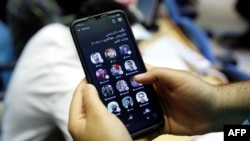Large swathes of Iran have been without Internet access for more than a day due to an outage imposed by state authorities as many people inside the country scramble for information amid air attacks from Israel.
"It has now been 24 hours since Iran imposed a nationwide internet shutdown; the ongoing blackout incident is the most severe tracked since the November 2019 protests and impacts the public's ability to stay connected at a time when communications are vital," London-based NetBlocks, an organization that monitors cybersecurity, said in a post on social media on June 19.
Israel launched an air offensive against military and nuclear targets across Iran on June 13, saying it was necessary to halt Tehran's nuclear program.
The air strikes have sent thousands of Iranians scrambling out of major cities as many decide the risks of waiting out the conflict at home are simply too high.
Many rely on the Internet to monitor where strikes are located, to check on family, and to find the best escape routes.
Several Iranians inside the country confirmed to RFE/RL that Internet access was either down or inconsistent, making it difficult to communicate.
At the best of times, Iranian authorities keep a fairly tight grip over access to the Internet, often limiting or completely blocking access to popular social media pages such Instagram, as well as Facebook, X (formerly Twitter), YouTube, Telegram, and WhatsApp.
It also has outlawed the use of tools such as virtual private networks (VPNs) designed to bypass Internet censorship.
"I believe [authorities] have shut down the Internet to prevent an uprising by the people and also to manage the [crisis] situation," cybersecurity expert Mamadou Babaei told Radio Farda.
"The internet isn't fully cut, there are still some ways for people to get online."
In its 2024 Internet freedom report, Freedom House noted Iranian authorities had "taken steps to make access to the global Internet more cumbersome and expensive, and drive users to a domestic version of the Internet where authorities can more effectively control content and monitor users."
Censorship and restrictions on the usage of the Internet in Iran intensified with major protests that followed the September 2022 death of Mahsa Amini.
Amini died in police custody for an alleged hijab violation. Her death sparked the Women, Life, Freedom movement and nationwide unrest over the government's restrictions on women and their daily lives.
Israel and many of its Western allies, including the United States, accuse Iran of seeking to build nuclear weapons. Tehran has vehemently rejected the accusations, saying its atomic program is purely for civilian purposes.












